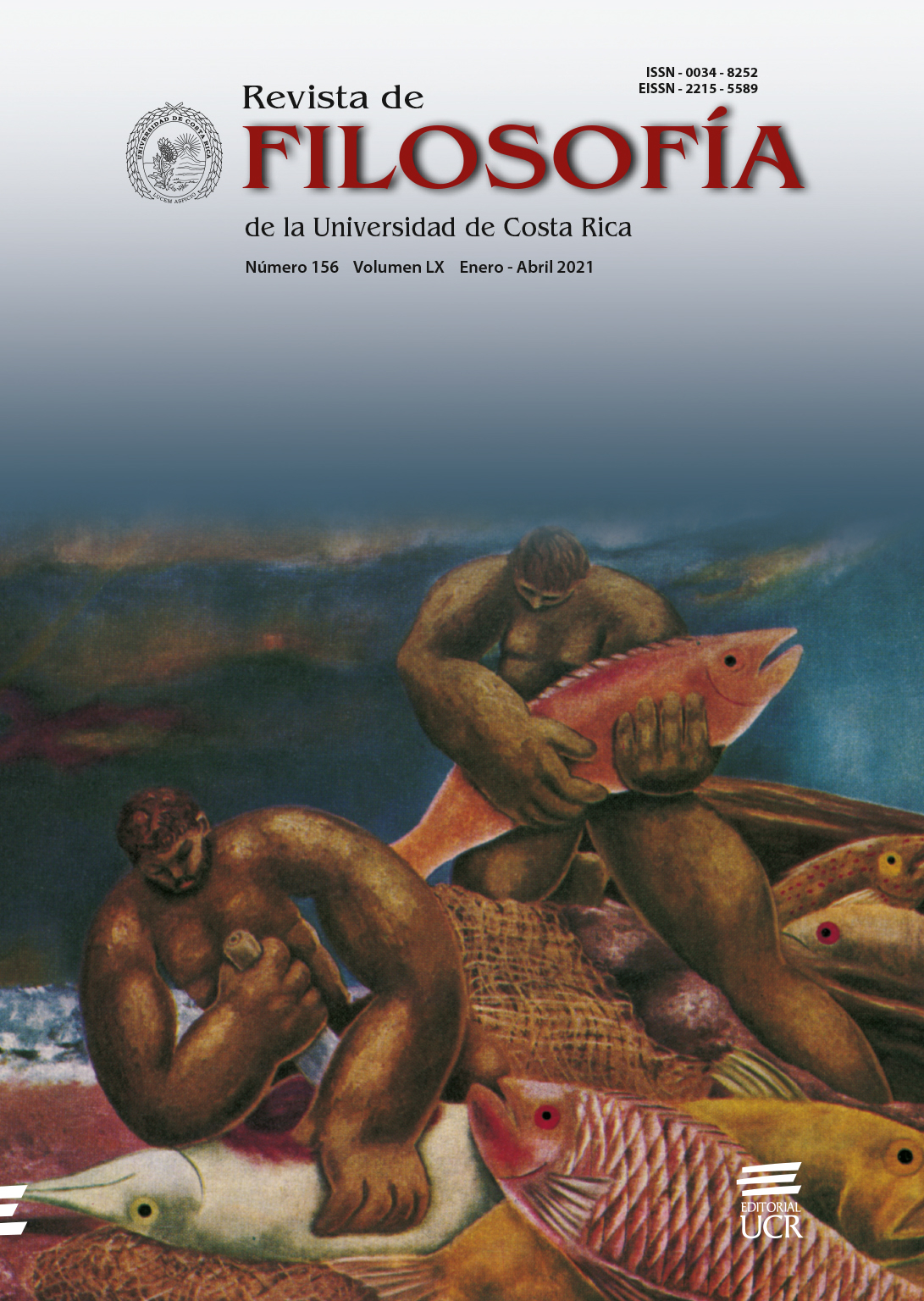Resumen
El presente trabajo aporta un enfoque original a la investigación de los procesos lógicos que condicionan que unas formas participen de otras. La introducción del concepto de participación relacional permite gestionar con eficacia los problemas de auto-referencia de las formas platónicas. En su aplicación a lo semejante y lo desemejante en Parménides 132d-133a, aflora una posible vía de solución de las distintas versiones del argumento del «tercer hombre». Puede resultar de interés, asimismo, el método de generación de los números a partir de lo par y lo impar; la participación relacional en estas formas facilita la interpretación de Parménides 143e-144a.
Citas
ALLEN, R. E. (1997). Plato’s Parmenides. Rev. ed. New Haven and London: Yale University Press.
ALONSO ÁLVAREZ, Á. (2012). Idolatría de las matemáticas [Idolatry of mathematics]. Exclusive edition. León: Printed 2000.
ANNAS, J. & WATERFIELD, R. (Eds.) (1995). Plato: The Statesman. Cambridge: Cambridge University Press.
AUTHOR (2019).
─── (a). “Método dialéctico y verdad en el Parménides de Platón” [Dialectical method and truth in Plato’s Parmenides]. Accepted by the journal Daimon.
─── (b). “El Parménides y la versión del argumento del «tercer hombre» relativa a la grandeza” [Parmenides and the version of the Third Man Argument regarding largeness]. Accepted by the journal Logos.
─── (c). “El Parménides de Platón y las paradojas de Zenón contra el movimiento” [Plato’s Parmenides and Zeno’s paradoxes of movement]. Pending review.
BURNET, J. (Ed.) (1900-1907). Platonis Opera, Recognovit Brevique Adnotatione Critica Instruxit. London: Oxonii E Typographeo Clarendoniano.
CORNFORD, F. M. (1939). Plato and Parmenides. London: Butler & Tanner.
DAVIDSON, D. (1990). Plato’s Philebus. New York/London: Garland Publishing.
FERRARI, G. R. F. (Ed.). (2000) Plato: The Republic. Cambridge: Cambridge University Press.
FINE, G. (1993). On Ideas: Aristotle’s Criticism of Plato’s Theory of Forms. Oxford: Clarendon Press.
HARTE, V. (2002). Plato on Parts and Wholes. Oxford: Clarendon Press.
HARWARD, J. (Ed.) (1932). The Platonic Epistles. Cambridge: Cambridge University Press.
HEATH, T. L. (1908). The Thirteen Books of Euclid’s Elements. Second Edition Unabridged, Vol. II (Books III-IX). Cambridge: Cambridge University Press.
HELMIG, C. (2007). “Platoʼs Arguments Against Conceptualism. Parmenides 132b3-c11 Reconsidered”. Elenchos, 28, pp. 303-333.
MARCOS DE PINOTTI, G. E. (1997). “Discurso y no ser en Platón (Sofista 260a-263d)” [Discourse and Not-Being in Plato (Sophist 260a-263d)]. Synthesis, Vol. 4, pp. 61-83.
PELLETIER, F. J. & ZALTA, E. N. (2000). “How to Say Goodbye to the Third Man”. Noûs, 34/2, pp. 165-202.
PENNER, T. & ROWE, C. (2005). Plato’s Lysis. Cambridge: Cambridge University Press.
REEVE, C. D. C. (Ed.). (2016). Aristotle: Metaphysics. Indianapolis/Cambridge: Hackett Publishing Company.
ROWE, C. (Ed.). (2015). Plato: Theaetetus and Sophist. Cambridge: Cambridge University Press.
SEDLEY, D. (Ed.). (2010). Plato: Meno and Phaedo. Cambridge: Cambridge University Press.
RICKLESS, S. C. (2007). Platoʼs Forms in Transition. A Reading of the Parmenides. New York: Cambridge University Press.
─── (Spring 2020). “Platoʼs Parmenides”. The Stanford Encyclopedia of Philosophy. Zalta, E. N. (Ed.).
SCOLNICOV, S. (2003). Platoʼs Parmenides. Berkeley/Los Angeles/London: University of California Press.
THEON OF SMYRNA (1979). Mathematics Useful for Understanding Plato. San Diego: Wizards Bookshelf.
TURNBULL, R. G. (1998). The Parmenides and Platoʼs Late Philosophy. Toronto: University of Toronto Press.
VLASTOS, G. (1981). “Self-Predication and Self-Participation in Platoʼs Later Period”. Platonic Studies. Second Edition. Princeton/New Jersey: Princeton University Press, pp. 335-365.
─── (1995). “The Third Man Argument in the Parmenides”. Studies in Greek Philosophy, Vol. II: Socrates, Plato, and Their Tradition. Graham, D. W. (Ed.). Princeton, New Jersey: Princeton University Press, pp. 166-190.
WATERFIELD, R. GREGORY, A. (Eds.). (2008). Plato: Timaeus and Critias. Oxford University Press.
##plugins.facebook.comentarios##

Esta obra está bajo una licencia internacional Creative Commons Reconocimiento-NoComercial-SinObraDerivada 3.0.
Derechos de autor 2021 Revista de Filosofía de la Universidad de Costa Rica

